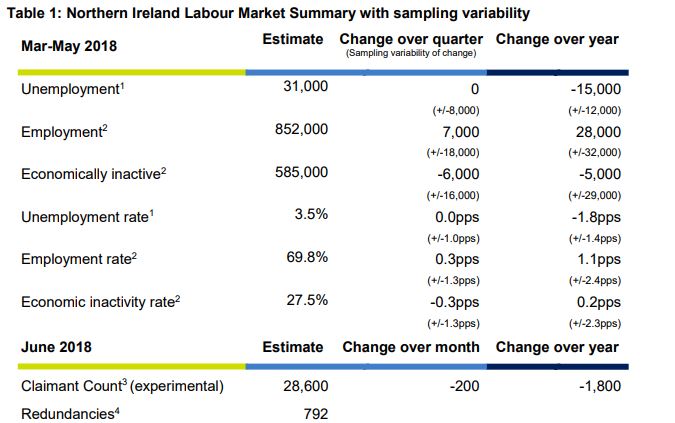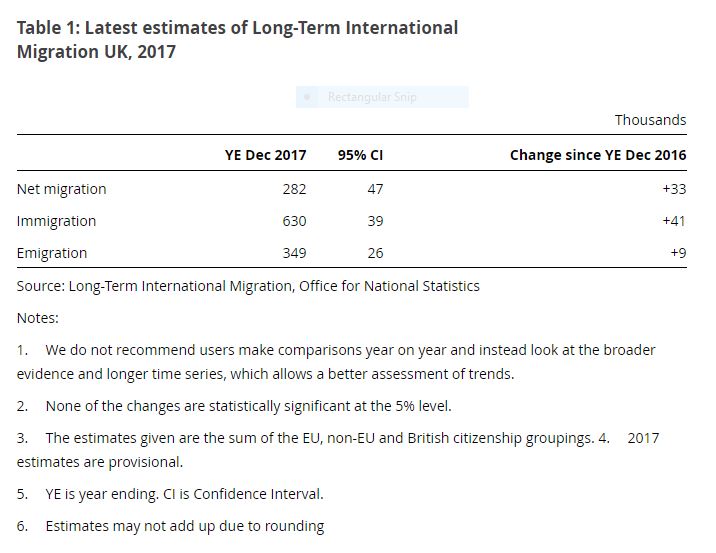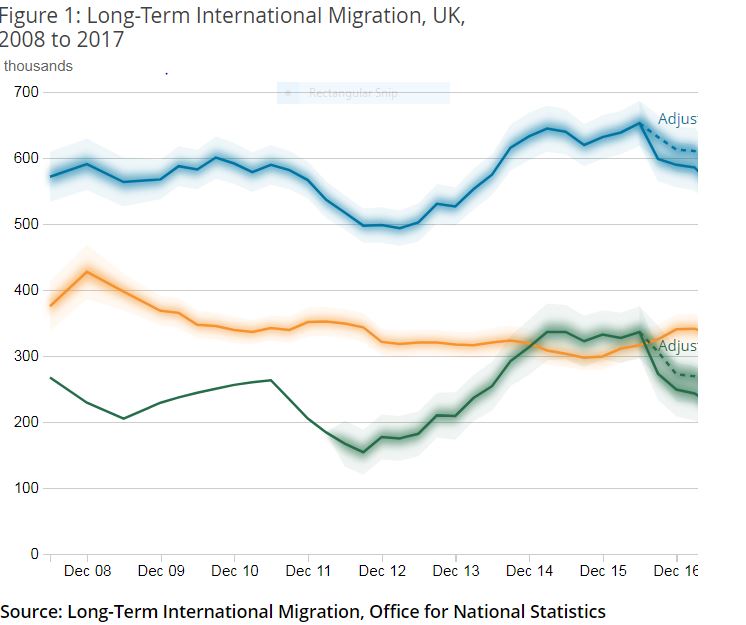Work TV
Watch our TV Channel dedicated to the ‘World of Work’. Explore our video library for informative videos featuring career opportunities at leading companies, franchising opportunities, further education and recruitment professions and their services.
Simon Collyer
End Hunger Announce October Conferance
End Hunger has announced that this October they will have their first End Hunger UK Week, starting on Monday, October 15.
End Hunger will have a week of events, campaigns and activism to get the message out that no one in the UK should have to go to bed hungry. In that time, they say they will be asking people to take part in activities around the country. Put the dates into your diary say organizers and think about ways you can hold policy-makers to account in your area.
National conference
As part of End Hunger UK Week, End Hunger will be having their second national conference on World Food Day, Tuesday, October 16. The conference will be held at Central Hall Westminster.
Last year End Hunger claim they had over 150 people from across the food movement attending, and speakers including experts in policy and campaigning as well as those with lived experience of poverty. Coming out of the conference they had a renewed focus on campaigning against holiday hunger, and for measurement of household food insecurity.
This year the organizers say we will be even bigger, giving people an opportunity to learn about the issues, get involved in their campaigns, and speak directly to policy-makers.
Since the launch of their petition to fix Universal Credit End Hunger have had an unprecedentedly positive response. With online signatures alone reaching over 1,000 in just the first week and hundreds of paper petitions being downloaded, End Hunger are excited about the impact of the voice of the anti-hunger movement being heard by policy-makers.
ABC Comment, will you be supporting end hunger?

Change Of Course Needed to Reverse Crisis in Living Standards
Liberal Democrat Work and Pensions spokesperson Stephen Lloyd MP has called for cuts to Universal Credit and benefits to be reversed following the publication of the Resolution Foundation’s annual Living Standards Audit.
According to the report published today [24 July 2018], incomes are stagnating across the board and falling for the poorest 30% of households, while child poverty is on the increase.
Commenting on the report, Stephen Lloyd MP said:
“The British economy simply isn’t working for most people. Years of chronic underinvestment in infrastructure and skills, a devastating crash caused by over-reliance on the banks, and now the economic uncertainty caused by this chaotic Conservative Government have eaten away at people’s living standards. We must demand better.
“As a matter of urgency, deep cuts to Universal Credit and benefits that are disproportionately hurting poorer families should be reversed. We must also ensure that employees have a greater voice in their workplaces, and make employment rights fit for the age of the ‘gig economy’.”
ABC Comment: Have your say below:

Disabled Should Have Full Public Apology, Full Back Payments And Financial Compensation For All Those Affected Due To DWP Mistakes Say SNP
The SNP has called on the Tory government to pay compensation to disabled people who were left out of pocket as a result a major error by the UK Department for Work and Pensions (DWP).
Responding to a new report by the Public Accounts Committee (PAC), SNP Social Justice spokesperson, Neil Gray, said Tory "chaos and incompetence" had left thousands of chronically ill and disabled benefit claimants in financial difficulty, and called for the UK government to make a public apology, full back payments to 2011, and give financial compensation to those affected.
The PAC report, published today, highlights an estimated 70,000 claimants were underpaid by £5,000 to £20,000 between 2011 and 2016 because the DWP incorrectly underpaid them when moving them from Incapacity Benefit to Employment and Support Allowance (ESA). The error also meant claimants were denied their right to support with the cost of medical prescriptions, dentistry, and school meals.The PAC estimate the cost of fixing the UK government's error will be over £350million in back payments and administrative costs alone.
Claimants could now receive up to £10,000 of wrongly underpaid benefits.
Child Poverty Action Group’s solicitor Carla Clarke said:
“Poor and inadequate DWP processes left up to seventy thousand disabled individuals without the support they should have received to help them with their additional costs. Justice required that the DWP error was corrected in its entirety for the people affected, many of whom are owed arrears from 2011. We are pleased that the DWP agreed that this was correct following our legal action. However, it shouldn’t be necessary to take a government department to court to achieve justice for people who have been failed by officials making avoidable errors”.
1.5 million people were transferred from older incapacity benefits to ESA between 2011 and 2014. The underpayments at issue arose from the DWP’s failure to consider whether claimants who were transferred from incapacity benefit to employment and support allowance qualified for income-related ESA - which can include entitlement to extra premiums - rather than just for contribution-based ESA.
In December 2017, then Work and Pensions Secretary, David Gauke, announced that the Department for Work and Pensions would undertake a trawl of cases to identify those claimants who had been underpaid and put things right.

ABC Comment: Have your say below:

The ABC Does Battle with Bristow Sutor and Essex County Council
Late last year ABC founder Simon Collyer drove through what he now knows is a Bus Gate. Bus Gates are redistricted road sections which you cannot drive on. Simon won his first case and the PCN was withdrawn as the road signs lighting was not working. However, the Court that adjudicates these matters, held that the second PCN issued during daylight was correct.
We cannot discuss this Case in detail, but during the adjudication period, it appeared that 'Bus Gates' were not included in the four documents downloadable from the YouGov website despite the legislation that allowed Bus Gates to be enacted back in April 2016. These documents included The Highway Code and Know Your Road Signs. Simon is now suing the Department of Transport and looking at taking the Court itself to Court, as the appeals system prevents people from appealing to a Higher Court and appears to Breach Article 6 (ECRH) European Court of Human Rights. This matter is about the civil rights of European motorists than road layouts.

Enter aggressive bailiffs Bristow Sutor, adding huge fees onto the original amount. Bristow Sutor have an 0871 number and they are in no hurry to answer your call either, requiring you to queue on-line to have your call answered.
Calling 0871 numbers is very expensive, particularly if you use a mobile phone and you will always want to avoid calling them if possible.
How much does it cost to call an 0871 number?
| Provider | 0871 call cost plus access charges |
| BT landline | 12p to 25p per minute, plus up to 13p per call |
| EE mobile | 44p to 63p per minute, plus up to 13p per call |
| KC landline | 10p to 23p per minute, plus up to 13p per call |
| O2 mobile | 45p to 68p per minute, plus up to 13p per call |
| Post Office landline | 10p to 23p per minute, plus up to 13p per call |
| Sky Talk landline | 12p to 25p per minute, plus up to 13p per call |
| TalkTalk landline | 8p to 21p per minute, plus up to 13p per call |
| Three mobile | 45p to 58p per minute, plus up to 13p per call |
| Virgin Media landline | 11p to 24p per minute, plus up to 13p per call |
| Vodafone mobile | 45p to 68p per minute, plus up to 13p per call |
When you are on pay monthly deal, you will pay 41p on EE, 28P on 02, 40p on Orange, 35p on T-Mobile, 30p on Three, 41p on Virgin mobile and finally 20p on Vodafone. When you are on pay-as-you-go packages, you will pay 41p on EE, 40p on GiffGaff, 31p on 02, 41p on Orange, 40p on T-Mobile, 35p on Three, 41p on Virgin Mobile and lastly 41p on Vodafone.
We are complaining to our Member of Parliament about these 'phone costs but in the meantime, how to tackle Council Bailiffs?
If you haven’t paid a debt you might be sent a letter from bailiffs (also called ‘enforcement agents’) saying they will visit your home to collect payment.
You must not ignore the letter - this is called a ‘notice of enforcement’. If you do the bailiffs can visit your home after 7 days. As well as collecting payment for the debt they can charge you fees so you could end up owing more money, says Citizens Advice.
What you need is the Warrant of Control number and this is not easy to find on documentation and may not be their at all? In our case we had to telephone Bristow Sutor to get the number racking up more charges in the process. You then need legal form n245, which can be downloaded via the Internet. Complete this form and send in a budgeting sheet and an explanatory letter to your Magistrates Court.
The Bailiffs want to frighten people into paying up, and you will need to stand your ground and not be pressurized into an agreement you cannot afford and the best way of dealing with them is to not answer the door.
You can check the Bailiffs register to see if they are official Bailiffs, not Debt Collectors. You can check on the Bailiffs Register on the Justice website.
Balliffs cannot seize items you need like clothes and bedding. They cannot seize vehicles or tools of your trade under a certain sum. A good idea is to move vehicles to a lock-up garage or to a safe location.
These are the fees that can be charged: https://www.citizensadvice.org.uk/debt-and-money/action-your-creditor-can-take/bailiffs/how-bailiffs-should-treat-you/check-bailiffs-fees/
Once you are organized you can start to negotiate terms that are affordable with the help of the Court. Never refuse to pay, but not give in to Bailiff's pressure tactics.
A Trajic Loss of Life
Earlier this year a young man took his own life shortly after bailiffs clamped the motorcycle that was essential to his work as a courier. A case that has prompted calls for reform of the debt-collection industry.
The Guardian reported that Jerome Rogers, 20, was being pursued over two £65 parking fines that had escalated to a debt of £1,019 including non-payment penalties and fees for the use of bailiffs.

Image: Jerome Rogers driven to suicide by Council Balliffs.
After a coroner said on Friday that the presence of a bailiff outside Rogers’ home would have been intimidating, his mother, Tracey, called for sweeping changes to the way the industry works. Her comments echoed a recent report that said bailiffs sometimes used threatening or unlawful behavior and failed to take account of vulnerable clients.
The case is thought to be the first in which a suicide has been linked to a bailiff’s visit. But a report by several charities including Citizens Advice, Step Change Debt Charity, and the Children’s Society, published in March, expressed alarm about bailiff practices and called for significant changes to the law.
We must stop these Balliffs before more lives are lost, and at the ABC we will be campaigning for changes in the law. All citizens (Council Tax payers) should bring pressure on Councils that gets into bed with unethical organizations - ones that could drive people to suicide. Tragically reform will be too late for Mr. Rogers.
ABC Comments have your say below:

Northern Ireland Labour Market Survey Generally Positive
The latest Labour Force Survey (LFS) estimates for the period March-May 2018 indicate that, over the quarter, the employment rate increased, the economic inactivity rate decreased and the unemployment rate was unchanged. The number of people on the Northern Ireland claimant count (experimental) decreased in June 2018.
The proportion of people aged 16 to 64 in work (the employment rate) increased over the quarter (0.3pps) and increased over the year (1.1 pps) to 69.8%. Although the quarterly and annual changes were not statistically significant, the most recent employment rate was statistically significantly above employment rates in 2013. The latest employment rate recorded for the whole of the UK (75.7%) is the highest on record.
The LFS indicated that the NI unemployment rate (16+) was unchanged over the quarter but decreased over the year to 3.5% in March-May 2018. The decrease over the year of 1.8 pps was statistically significant and is likely to reflect real change.
The equivalent UK unemployment rate (4.2%) decreased by 0.1 pps over the quarter and decreased over the year by 0.3 pps to its joint lowest rate on record. The NI unemployment rate was below the UK unemployment rate, and also below the European Union (7.1%) rate and Republic of Ireland (5.9%) rate (April 2018).
The NI economic inactivity rate (the proportion of people aged from 16 to 64 who were not working and not seeking or available to work) decreased over the quarter to 27.5% and increased by 0.2 pps over the year. Although neither the annual nor quarterly changes were statistically significant, the March-May rate was statistically significantly lower than in 2009.
The number of people on the NI claimant count (experimental) decreased by 200 over the month to 28,600 in June 2018.
Please note these figures include Jobseeker’s Allowance Claimants and those claimants of Universal Credit who were claiming it principally for the reason of being unemployed. • During June 792 redundancies took place. This is the largest number of confirmed redundancies since November 2012.
ABC Comment, Have Your Say:

ONS Labour Market Survey July 17th
For the three months ending May 2018, the highest employment rate in the UK was in the South West (79.2%) and the lowest was in Northern Ireland (69.8%).
For the three months ending May 2018, the highest unemployment rate in the UK was in London (5.1%) and the lowest was in the South West (3.2%).
For the three months ending May 2018, the highest economic inactivity rate in the UK was in Northern Ireland (27.5%) and the lowest was in the South West (18.1%).
Between December 2017 and March 2018, the largest increase in workforce jobs in the UK was in the West Midlands at 64,000, whilst the largest decrease was in the South East at 47,000.
In March 2018, the region with the highest proportion of workforce jobs in the services sector was London at 91.3%, which has increased by 0.5 percentage points since December 2017, whilst the East Midlands had the highest proportion of jobs in the production sector at 13.8%.
The highest average actual weekly hours worked, for the 12 months ending March 2018, was in London at 33.5 hours and the lowest was in the South West at 31.1 hours; for full-time and part-time workers, it was highest in Northern Ireland, at 38.3 hours and 17.4 hours respectively.

Image: Frances O’Grady
Commenting on today’s (Tuesday) labour market statistics from the Office for National Statistics – which show that nominal wage growth is down for the second month in a row and real wage growth has also fallen – TUC General Secretary Frances O’Grady said:
“Wage growth has slowed again. Boosting pay packets should be a priority for the government, but ministers are failing to act.
“We need to get the economy moving again. The government should put the minimum wage up to £10 and give all public servants a proper pay rise.
“Unions are fighting hard to get workers up and down the UK decent pay rises – and anyone wanting a pay rise should join a union. But the government should also give unions the right to go into every workplace and negotiate with employers for fair pay rises.”
However commenting on today’s labour market figures, senior ONS statistician Matt Hughes said:
“We’ve had yet another record employment rate, while the number of job vacancies is also a new record. From this it’s clear that the labour market is still growing strongly. Meanwhile real earnings remain modestly up on the year, both including and excluding bonuses.”
Have your say below:

Google Introduces New Job Hunting Service
Google has introduced a new job hunting service for UK workers, which will enable individuals to “find jobs near me”.
The internet giant said the feature will make it easier to find jobs and will mean that job seekers will no longer need to visit individual recruitment websites. Positions will be ranked on quality and relevance and any fraudulent job postings will be filtered out. However, in order to apply individuals will still need to visit the third party sites.
“What job seekers get is the ability to find jobs from all over the internet. What the employers get is easier discoverability,” commented Google’s product manager Joy Xi.
This feature is already available in the US, India and South Africa, and this is the first time it has entered UK’s recruitment market. Some of Google’s partners on this include The Guardian Jobs, Reed.co.uk, The Telegraph, CV Library and totallylegal.
However, one of the major recruitment sites, Indeed, is refusing to partner with Google and share its data.
Google is currently not charging recruitment sites to have their listings featured. However, this may change in the future. “Undoubtedly it will start charging for placement and other premium services,” commented Robert Jeffrey from People Management magazine. “And for third-party sites that represents a risk.”
ABC Comment. Have your say below:

15,000 Bricklayers Needed - Sir Oliver Letwin Wrap up Speech at Housing 2018
Sir Oliver Letwin gave a refreshing and highly honest and informative speech to close Housing 2018 this year which some delegates have described it as the highlight discussion of the entire event.
In his discussion Sir Oliver gave an overview of the Independent Review of Build Out’s findings, and set out next steps ahead of publication of his final report in the Autumn. This was followed by Q&A including Sir Oliver, Simon Ridley, director general, decentralisation and growth at MHCLG and David Montague, chief executive at L&Q.
ABC Comment: Sir Oliver Letwin, is the Chairman of the Review Panel.
Independent review to tackle barriers to building
Panel of experts to review the gap between number of planning permissions being granted and those built in areas of high demand.
A vital independent review into understanding why hundreds of thousands of homes haven’t been built, despite having planning permission, is underway as a panel of experts is today (14 January 2018) unveiled by the Ministry of Housing, Communities and Local Government.
Originally announced at Autumn Budget, the review, led by Sir Oliver Letwin will look to explain the gap between the number of planning permissions being granted against those built in areas of high demand.
Currently, after planning permission is granted a variety of factors can prevent development from starting and slow down delivery and the review wants to determine why.
As of July 2016, just over half the 684,000 homes with planning permission had been completed.
The review will seek to identify the main causes of the gap and will make recommendations on practical steps to increase the speed of build out. Latest evidence shows that residential planning applications are up and that time to process major applications continues to be at a record high.
Sir Oliver Letwin, Chairman of the Review Panel, said:
This government is serious about finding ways to increase the speed of build out as well as tackling the complicated issues surrounding it.
That’s why we have set up this diverse panel to help me test my analysis and to make practical, non-partisan recommendations, as we look to increase housing supply that’s consistent with a stable UK housing market.
Housing Secretary Sajid Javid said:
We are determined to build the homes this country needs, but currently there is still a significant gap between the number of planning permissions being granted and the number of homes built.
This review is vital to helping us understand how we can build more homes quickly.
All parties have a role to play in closing the gap and I look forward to receiving Sir Oliver’s findings.
The review will be conducted in 2 phases:
Phase 1 – currently under way – will seek to identify the main causes of the gap by reviewing large housing sites where planning permission has already been granted. This will include information-gathering sessions with local authorities, developers, non-government organisations and others. Early findings will be published in the interim report.
Phase 2 will make recommendations on practical steps to increase the speed of build out, which will be published in the full report.
The review will also consider how to avoid interventions which might discourage house building or hinder the regeneration of complex sites.
Sir Oliver will be assisted by a team of leading experts:
- Richard Ehrman – author, small commercial property developer and former journalist. Former special adviser to the Secretary of State for Employment and subsequently Northern Ireland, onetime Chief Leader Writer of the Daily Telegraph, and former Deputy Chairman of Policy Exchange
- Lord Jitesh Gadhia – Member of House of Lords and investment banker
- Lord John Hutton – (Labour) Peer and former Secretary of State
- Rt Hon Baroness Usha Prashar CBE, PC – (Crossbench) Peer with a career spanning public, not for profit and private sectors, currently Deputy Chairman, British Council and a non-Executive Director of Nationwide Building Society
- Christine Whitehead – Emeritus Professor of Housing Economics at London School of Economics
ABC Comment, add your comment below:

ONS Figures Show Migration Into UK Has Stabilized
From the ONS.
Migration is a complex issue and to fully understand it we need to consider all information. Our best assessment shows around 280,000 more people coming to the UK than leaving in 2017, so net migration has continued to add to the UK population.
Net migration has fallen following record levels in 2015 and early 2016 and has been broadly stable since. This is similar to the level recorded in year ending September 2014. Underlying this, immigration has remained broadly stable at around 630,000 and emigration has shown a gradual increase since 2015 and is currently around 350,000.
Our assessment is that net migration has been broadly stable over the last year. Although the Long-Term International Migration (LTIM) estimates show an increase in net migration over the latest year, this is due to an unusual pattern in the estimates for student immigration in 2016, which was not seen in other sources and which our quality work suggests is an anomaly.
The number of non-EU citizens coming to the UK to study has remained relatively stable over the past few years based on an assessment of the International Passenger Survey (IPS), Home Office data on long-term study visas and Higher Education Statistics Agency (HESA) data together.
EU net migration continues to add to the UK population with around 100,000 more EU citizens coming to the UK than leaving. The estimated number of EU citizens coming to the UK “looking for work” continued to decrease over the last year and the number coming to the UK for a definite job has remained stable.
Since 2014, non-EU IPS estimates and Home Office data on long-term work visas show those coming to the UK to work have remained relatively stable, with increases for those on skilled work visas.
ABC Note: Because of the nature of illegal migration it is not possible to quantify accurately the number of people who are in the country illegally.
ABC Comment have your say on migration below:

Today Is John Ball Day (c. 1338 – 15 July 1381)
John Ball, (died July 15, 1381, St. Albans, Hertfordshire, Eng.), one of the leaders of the Peasants’ Revoltin England.
A sometime priest at York and at Colchester, Ball was excommunicated about 1366 for inflammatory sermons advocating a classless society, but he continued to preach in open marketplaces and elsewhere. After 1376 he was often imprisoned, and at the outbreak of the rebellion (June 1381) he was rescued from Maidstone prison by Kentish rebels, whom he accompanied to London. There he incited a crowd at Blackheath with the popular text “When Adam dalf [dug] and Eve span [spun], Who was then a gentleman?” An account in the Anonimalle Chronicle by a witness of the London events states that he urged the killing of lords and prelates.
After the rebellion collapsed, Ball was tried and hanged at St. Albans. Knowledge of his career comes almost entirely from prejudiced chroniclers. Jean Froissart calls him the mad priest of Kent. Ball is the subject of William Morris’s romance A Dream of John Ball.
The Peasants’ Revolt
Also called Wat Tyler’s Rebellion, (1381), first great popular rebellion in English history. Its immediate cause was the imposition of the unpopular poll tax of 1381, which brought to a head the economic discontent that had been growing since the middle of the century. The rebellion drew support from several sources and included well-to-do artisans and villeins as well as the destitute. Probably the main grievance of the agricultural labourers and urban working classes was the Statute of Labourers (1351), which attempted to fix maximum wages during the labour shortage following the Black Death.
If you would like to learn about John Ball you can contact his society. Please click below:

Images: Colchester Town Hall.
Have your say below:




























